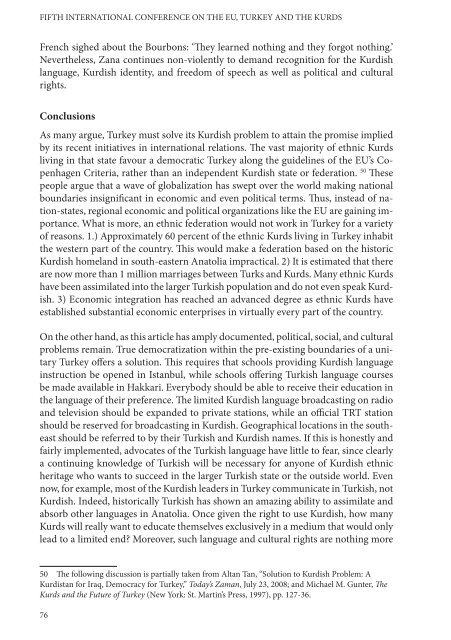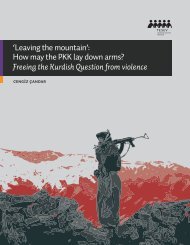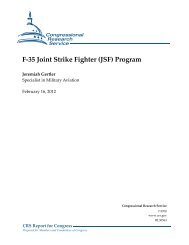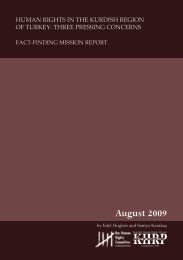FIFTH INTERNATIONAL CONFERENCE ON THE EU TURKEY AND THE KURDS
fifth international conference on the eu, turkey and the kurds
fifth international conference on the eu, turkey and the kurds
You also want an ePaper? Increase the reach of your titles
YUMPU automatically turns print PDFs into web optimized ePapers that Google loves.
<strong>FIFTH</strong> <strong>INTERNATI<strong>ON</strong>AL</strong> <strong>C<strong>ON</strong>FERENCE</strong> <strong>ON</strong> <strong>THE</strong> <strong>EU</strong>, <strong>TURKEY</strong> <strong>AND</strong> <strong>THE</strong> <strong>KURDS</strong><br />
French sighed about the Bourbons: ‘They learned nothing and they forgot nothing.’<br />
Nevertheless, Zana continues non-violently to demand recognition for the Kurdish<br />
language, Kurdish identity, and freedom of speech as well as political and cultural<br />
rights.<br />
Conclusions<br />
As many argue, Turkey must solve its Kurdish problem to attain the promise implied<br />
by its recent initiatives in international relations. The vast majority of ethnic Kurds<br />
living in that state favour a democratic Turkey along the guidelines of the <strong>EU</strong>’s Copenhagen<br />
Criteria, rather than an independent Kurdish state or federation. 50 These<br />
people argue that a wave of globalization has swept over the world making national<br />
boundaries insignificant in economic and even political terms. Thus, instead of nation-states,<br />
regional economic and political organizations like the <strong>EU</strong> are gaining importance.<br />
What is more, an ethnic federation would not work in Turkey for a variety<br />
of reasons. 1.) Approximately 60 percent of the ethnic Kurds living in Turkey inhabit<br />
the western part of the country. This would make a federation based on the historic<br />
Kurdish homeland in south-eastern Anatolia impractical. 2) It is estimated that there<br />
are now more than 1 million marriages between Turks and Kurds. Many ethnic Kurds<br />
have been assimilated into the larger Turkish population and do not even speak Kurdish.<br />
3) Economic integration has reached an advanced degree as ethnic Kurds have<br />
established substantial economic enterprises in virtually every part of the country.<br />
On the other hand, as this article has amply documented, political, social, and cultural<br />
problems remain. True democratization within the pre-existing boundaries of a unitary<br />
Turkey offers a solution. This requires that schools providing Kurdish language<br />
instruction be opened in Istanbul, while schools offering Turkish language courses<br />
be made available in Hakkari. Everybody should be able to receive their education in<br />
the language of their preference. The limited Kurdish language broadcasting on radio<br />
and television should be expanded to private stations, while an official TRT station<br />
should be reserved for broadcasting in Kurdish. Geographical locations in the southeast<br />
should be referred to by their Turkish and Kurdish names. If this is honestly and<br />
fairly implemented, advocates of the Turkish language have little to fear, since clearly<br />
a continuing knowledge of Turkish will be necessary for anyone of Kurdish ethnic<br />
heritage who wants to succeed in the larger Turkish state or the outside world. Even<br />
now, for example, most of the Kurdish leaders in Turkey communicate in Turkish, not<br />
Kurdish. Indeed, historically Turkish has shown an amazing ability to assimilate and<br />
absorb other languages in Anatolia. Once given the right to use Kurdish, how many<br />
Kurds will really want to educate themselves exclusively in a medium that would only<br />
lead to a limited end? Moreover, such language and cultural rights are nothing more<br />
50 The following discussion is partially taken from Altan Tan, “Solution to Kurdish Problem: A<br />
Kurdistan for Iraq, Democracy for Turkey,” Today’s Zaman, July 23, 2008; and Michael M. Gunter, The<br />
Kurds and the Future of Turkey (New York: St. Martin’s Press, 1997), pp. 127-36.<br />
76





